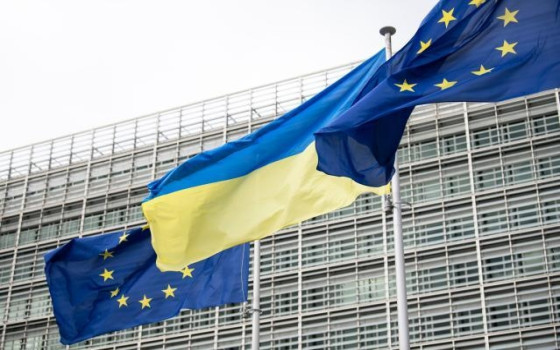
Following a review of the free trade agreement, Brussels announces a new chapter in trade relations between Ukraine and the European Union, benefiting exporters, businesses, and farmers on both sides.

- Europe and Arabs
- Monday , 30 June 2025 17:56 PM GMT
Brussels: Europe and the Arabs
It was announced in Brussels that the Commission and Ukraine have reached an agreement in principle on the review of the bilateral Deep and Comprehensive Free Trade Agreement (DCFTA), following the Article 29 consultation process.
This agreement opens a new chapter in trade relations between the European Union and Ukraine.
It establishes a long-term, predictable, and reciprocal framework that benefits exporters, businesses, and farmers on both sides and advances Ukraine's path towards EU membership.
According to a European statement issued by the European Commissioner, "This is fully consistent with our dynamic trade relations, which are witnessing continuous growth. Trade volume reached approximately €67 billion in 2024, up from €26 billion in 2016, when the Deep and Comprehensive Free Trade Agreement (DCFTA) eliminated most tariffs for the first time.
This partnership has also delivered economic results for the EU, generating a trade surplus of €18 billion.
Today's agreement is, in principle, balanced, fair, and realistic. It represents the best possible outcome under challenging geopolitical circumstances.
Politically, this agreement represents a strong signal of unwavering support for Ukraine in defending its sovereignty and democratic future.
Most importantly, it also responds to the concerns expressed by our Member States, farmers, and food producers.
Key elements of the agreement include:
Ukraine's commitment to gradually align its agricultural production standards with EU standards by 2028, in line with its accession objectives.
We have established a robust safeguard mechanism to protect EU markets, particularly where imports could cause significant difficulties at the EU or Member State level.
This agreement expands trade opportunities for agricultural and food products.
For sensitive goods, such as eggs, sugar, and wheat, quotas will increase, but they will remain below historical trade volumes to ensure stability in the EU market.
For less sensitive products, quotas will increase moderately, while some products will be fully liberalized.
In return, Ukraine will increase export quotas for pork, poultry, and sugar, and reduce or eliminate tariffs on other products. This will enhance export opportunities for European farmers, especially in Member States neighboring Ukraine.
We also agreed to review this agreement in the coming years, taking into account Ukraine's economic integration and progress in aligning it with EU standards.
While the main outlines have been agreed upon, technical details will be finalized soon.
The two sides will begin their own procedures, with EU Council approval required before entry into force.
Meanwhile, transitional arrangements implemented after the expiry of the EU-wide safeguards mechanisms will ensure ATM on June 5: Trade flows continue uninterrupted.
In conclusion, I would like to thank Commissioner Hansen for his excellent cooperation throughout this process. I also express my appreciation to the dedicated negotiating teams in the Commission and in Ukraine.
The Commission statement read: "Once again, this is a forward-looking and balanced agreement. It supports Ukraine's European future, safeguards the interests of EU farmers, and provides the stability and predictability our trade relations need in these uncertain times.
With the EU-Ukraine Association Agreement, including the Deep and Comprehensive Free Trade Area (DCFTA), there is a strong and dynamic trading relationship between the EU and Ukraine. The DCFTA eliminated the vast majority of all tariffs in our bilateral trade when it entered into force in 2016, and since then our bilateral trade volume has doubled from €26 billion in 2015 to €67 billion in 2024.
Following Russia's war of aggression against Ukraine, the EU has taken significant measures to support Ukraine in various ways.
Regarding trade, the EU has been granting autonomous trade measures since June 2022. This unilaterally removed EU tariffs and quotas on 36 agricultural products that had not been abolished in 2016. This has allowed Ukraine's agrifood exports to the EU to grow.
These autonomous trade measures have been extended twice and now expire on June 5, being replaced by a transitional quota-based regime in 2016. These were exceptional tools that provided a very high level of unilateral liberalization on an annual basis since 2022, at a time of great urgency and necessity. We now need to move to the principles of predictability and long-term reciprocity within the broader accession framework.
Therefore, on the occasion of the recent renewal of the free trade mechanisms, it was decided to establish the trade relationship on a more sustainable basis through a review of the Deep and Comprehensive Free Trade Agreement (DCFTA) provided for in Article 29 of the agreement.
In recent weeks, constructive talks have been held with Ukraine to review the bilateral trade agreement. This is essential to ensure a more stable and predictable basis for exporters, businesses, and farmers on both sides. The sensitivities in some agricultural sectors, particularly in Member States neighboring Ukraine, have been fully taken into account.












No Comments Found